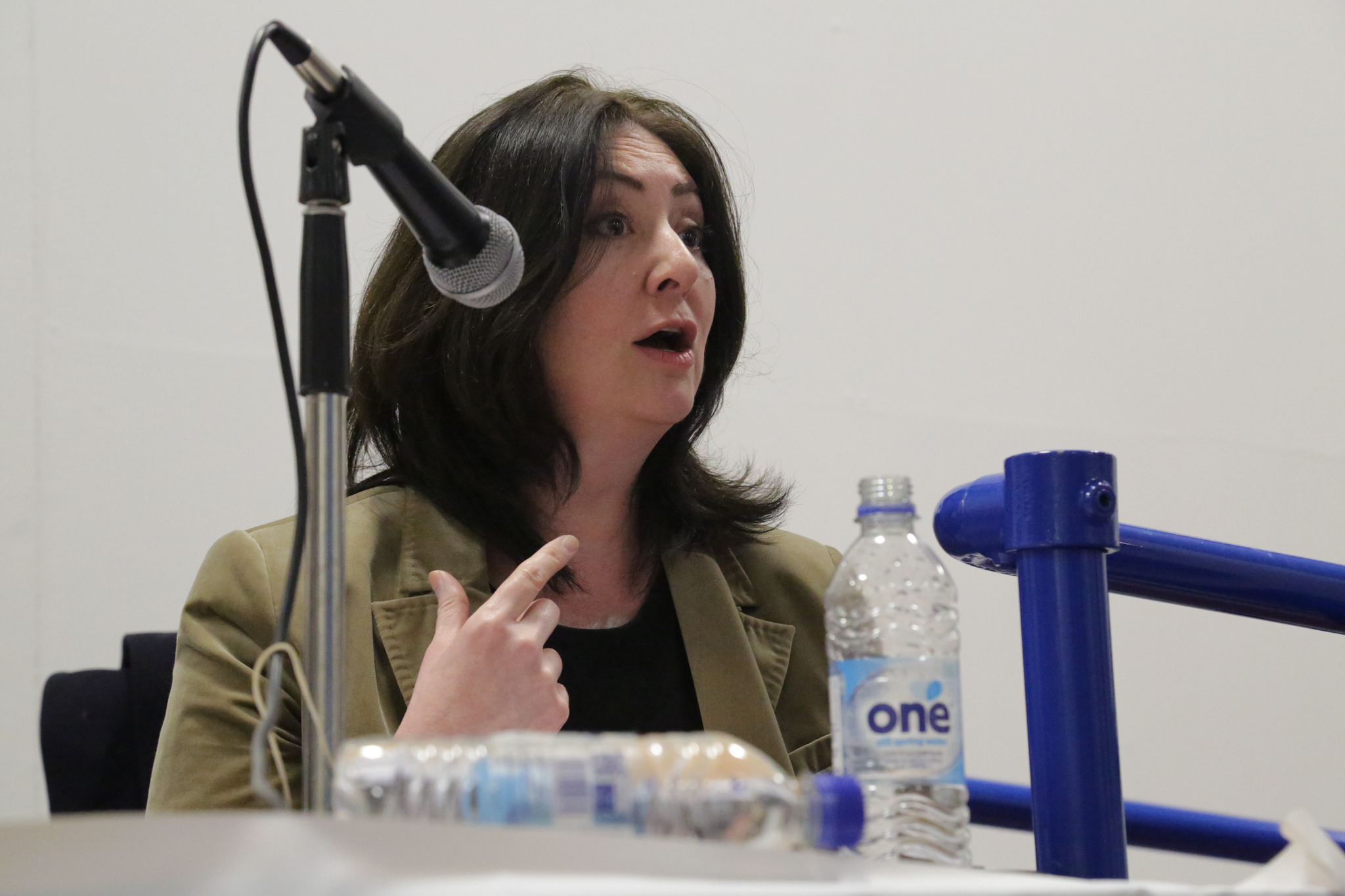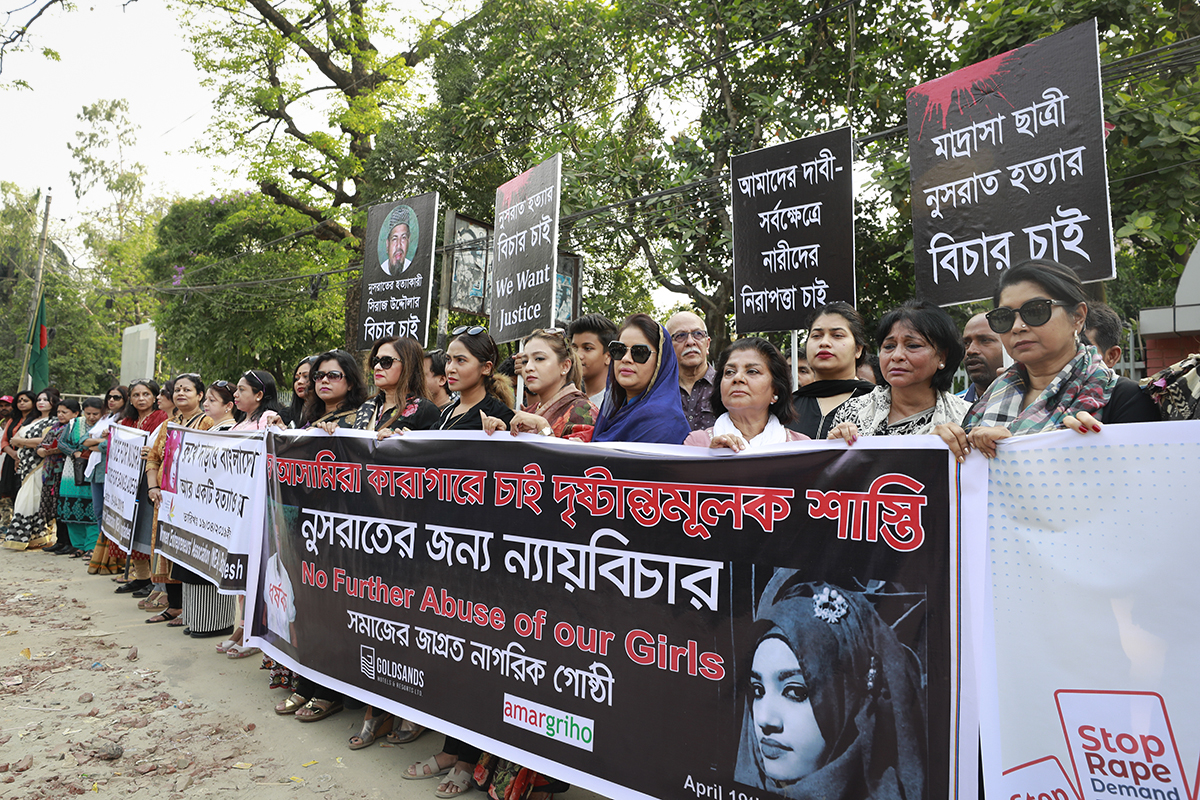Art and Culture
The Shame and the Disgrace of the Pro-Islamist Left
The dismal spectacle of radical queer activists, feminists, and sundry other progressives professing solidarity with Islamists is at once fascinating and enraging.

“By supporting fundamentalists, the Left simply chooses one camp in a political struggle without acknowledging it.” Maryam Namazie, a trenchant campaigner against religious fundamentalism, made this observation last week during a fraught lecture at Goldsmiths, University of London. It would turn out to be pertinent.
Namazie’s appearance at Goldsmiths was causing trouble before the event had even begun. The day before the event, the university’s Islamic Society (ISOC) let it be known that they considered Namazie to be a “renowned Islamophobe” whose presence on campus would cause ISOC members to feel “extremely uncomfortable,” and constitute a violation of their “safe space.” Such a reaction was tiresome but unsurprising. Goldsmiths’ ISOC is, after all, an Islamist-led organisation, dominated by people who hold precisely the kind of beliefs Namazie spends her days attacking.
When expressions of Islamist self-pity failed to get her disinvited, ISOC members resorted to childish disruption of the talk itself, giggling, talking, heckling, and interfering with her power-point as she tried to speak. The video of the event (which can be seen here) makes for a depressing watch.
But what followed was more depressing still, and offered an instructive example of the moral collapse of the activist Left to which Namazie had referred in her lecture. “Solidarity,” she had warned, “has become increasingly defined, not in political terms, as collective action in pursuit of certain political ideals, but in terms of ethnicity or culture. And since those in power [within Muslim communities] determine the dominant culture, many student unions—those on the Left, and even feminists—side with Islamism at our expense.”
And so it was that when ISOC misrepresented the event as an unhappy tale of marginalisation and Islamophobia, both the Goldsmiths Feminist Society and the LGBTQ+ Society quickly released statements pledging their support and solidarity with ISOC. “We support them,” FemSoc soberly declared, “in condemning the actions of the Atheist, Secularist and Humanist Society and agree that hosting known islamophobes at our university creates a climate of hatred.” Two days later, the LGBTQ+ Society came up with this:
We condemn AHS and online supporters for their islamophobic remarks, attitudes, and harassment. If they feel intimidated, we urge them to look at the underpinnings of their ideology. We find that personal and social harm enacted in the name of ‘free speech’ is foul, and detrimental to the wellbeing of students and staff on campus.
In a positively craven gesture, the Goldsmiths Student Union has since written to Namazie requesting that the recording of the event be removed from YouTube. (She refused.)
The dismal spectacle of radical queer activists, feminists, and sundry other progressives professing solidarity with Islamists is at once fascinating and enraging. Whatever kind of higher education survives in ISOC’s utopian caliphate, it’s certain that no feminist or LGBTQ+ societies will be permitted to exist.
But for radical university students in the West, their lives of almost unparalleled opportunity, privilege, and comfort are a source of considerable guilt and anxiety. So conspiratorial notions of omnipresent oppression have been contrived against which they oblige themselves to struggle. This idea is supported by claims that liberal democracy is a sham, that objectivity is illusory, and that reason is elitist. And since all that makes rational discussion virtually impossible, debates about ideas are transformed into competing professions of woe, decided by whoever turns out to be subject to the greater degree of structural oppression.
By way of a further explanation of their stance, the LGBTQ+ Society directed browsers of their Facebook page to a 34-page paper written by Caribbean academic Charles W. Mills, which flatly concludes:
In short, the moral and political agenda of those persons not originally seen as full persons will be significantly different from the agenda of those whose personhood has traditionally been uncontested, and we need concepts, theories, and narratives which register this crucial difference.
Namazie is a woman, an Iranian (and thus a “person of colour”), an ex-Muslim, a feminist, and a campaigner for secularism and human rights. And yet apparently she still hasn’t collected enough oppression points to outbid theocratic fascist males, conversant in the hand-holding jargon currently fashionable on the Tumblr Left.
I’m doubtful that either the LGBTQ+ Society or FemSoc or the student union has the slightest interest in Islamist ideology or what ISOC’s own invited speakers have to say about gay and female emancipation. Frankly, I’d be astonished if they watched the video of the debate before publishing their statements of solidarity. Why bother? Since Muslims are considered a homogenous protected group of victims and atheists are numbered amongst their tormentors, ISOC’s claim to emotional distress was probably enough. Besides which, surely all radicals—including Islamists—ought to unite in opposition to the common foe: a corrupt, greedy, imperialist, and Islamophobic establishment of which Maryam Namazie is presumed to be some kind of instrument.
Sustaining such a belief requires a person to ignore a lot of information. To be able to shut out anything ideologically disagreeable, and to stigmatise those who come bearing uncomfortable news, is therefore useful. It is also profoundly damaging.
It would be bad enough if university activists were simply indifferent to Islamist ideology and its victims. But when they go out of their way to attack people like Namazie as a bigot and an oppressor, and to dismiss her arguments and experiences as therefore unworthy of consideration, they make the lives of all campaigners against fundamentalism considerably more difficult. Apart from the aggravation caused by having to deal with the abuse and defamation itself, it forces them to fight a war on two fronts.
I have seen Namazie speak a number of times, and on each occasion she has had to waste time explaining the exasperating moral blindness of people whose support for secularism and universal human rights ought to be a foregone conclusion. But those who recoil from politically incorrect music or an infelicitous joke find they have nothing to say about honour-based violence, forced marriage, the execution of gays and apostates, or the veiling, stoning, subjugation, and genital mutilation of women. Afraid to be seen to lend their support to racist and imperialist “narratives,” they instead assuage their guilty consciences by denouncing those whose activism shames their silence.
In late 2013, a scandal erupted when it was revealed that advocacy organization Universities UK had published diversity advice (since withdrawn) recommending segregation of audiences by gender at Islamist events on campus. The New Statesman’s Laurie Penny, a young feminist writer who has built a career on radical self-disgust, protested in the Guardian that she could hardly be expected to condemn religious gender apartheid while women remained under-represented at the top levels of the academy. “Horror stories about Muslim misogyny,” she added, “have long been used by western patriarchs to justify imperialism abroad and sexism at home.” She went on:
We are the fools, if we believe that accepting aggressive distinctions between nice, safe western sexism and scary, heathen Muslim sexism is going to serve the interests of women. The people making these arguments don’t care about women. They care about stoking controversy, attacking Muslims and shouting down feminists of all stripes.
And yet the distinction between the sexism women experience in the West and the misogyny endured by women across the Muslim-majority world and diaspora is indisputably huge. And while Laurie Penny and the activists at Goldsmiths discretely look the other way, many courageous people are paying a terrible price for noticing this self-evident truth. As Namazie pointed out, in Bangladesh, secular and feminist bloggers are being murdered in the streets with machetes, while across the Middle East and North Africa, free thinkers are languishing in jail or awaiting flogging or death.

But in the West too, cartoonists, writers, filmmakers, artists, and journalists are being assassinated or forced to live fugitive lives under security protection. And those not being threatened with Islamist violence are being traduced by campaigns of defamation in which ostensibly progressive people are eagerly participating. “Salman Rushdie” the writer Paul Berman observed, “has metastasized into an entire social class.”
In the wake of the 2005–06 Danish cartoon crisis, twelve such people—one for every drawing—signed a statement of solidarity with the embattled artists. Entitled “Together Against The New Totalitarianism,” this short document was written by the feminist and Charlie Hebdo staff member Caroline Fourest. It was a statement of considerable principle and courage produced in a climate of gathering fear, and Maryam Namazie was among its signatories. The concluding paragraphs read as follows:
"We refuse to renounce our critical spirit out of fear of being accused of “Islamophobia,” a wretched concept that confuses criticism of Islam as a religion and stigmatization of those who believe in it.
We defend the universality of the freedom of expression, so that a critical spirit can be exercised in every continent, with regard to each and every abuse and dogma.
We appeal to democrats and independent spirits in every country that our century may be one of enlightenment and not obscurantism."
That so many on the Left fail to see the importance and value of such sentiments is a shame. That they contrive to re-describe them as something sinister and ignoble is a disgrace.






